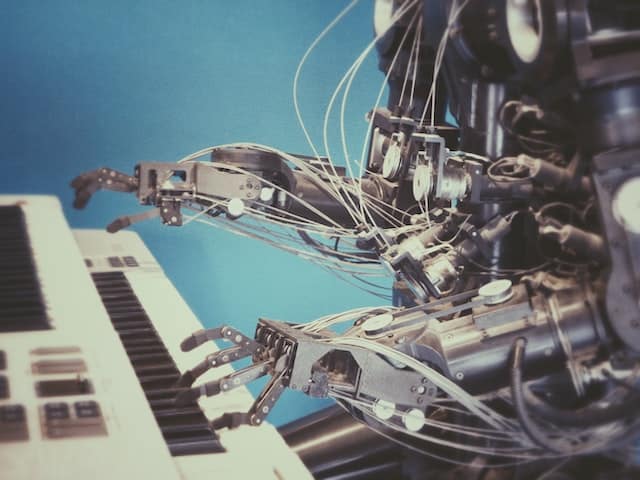With apps like Soundful getting more popular each day, a lot of people are starting to worry about musicians losing their jobs.
As both a musician and an economics nerd (I hold a master’s degree in applied economics) with a particular interest in the effects of automation in the job market, I felt like I had to write something about this to bring calm to my fellow GearAficionados.
So, are musician jobs really at risk with AI music-generating tools becoming widely available?
Most musician jobs are not at risk to be lost over AI software. Automation is an enhancer, proven in recent history, that can boost productivity and even end up creating more new jobs. The only jobs at risk are the ones of the lowest skilled workers that limit themselves to crafting basic beats.
In this article, I will tell you all you need to know about how automation can affect your job as a musician in the following years.
After leaving this page, you will have a clearer idea of what are the actual risks for music workers now that AI software is starting to shake the industry, and what you can do to protect your job against our robot overlords.
Before getting started, for an easier-to-digest take on this topic, you should watch our YouTube video on it:
1. Automation has already failed to disrupt other industries
To kick things off, let’s first talk about other times when automation didn’t really end the world or anything like it.
Have you heard about the automobile?
Well, until the 1920s it was as crazy an idea as having a computer writing music for you.
When cars started popping up more and more in cities, the word around was that the horse industry will eventually come to its demise leaving lots of workers in the streets.
Fast-forward a few decades and it was clear that cars were more efficient, less cruel, and created way more jobs around them than horses ever could in millennia.
No shade to horses, tho. They are great.
Another typical case study about automation that perhaps all econ students read about is what happened with ATM machines in the 80s.
Before ATMs, you would have to wait in line and talk to an actual human being about depositing or withdrawing money from your account.
It sounds like absolute madness, right?
The majority, or a big chunk of bank employees were actually people dedicated solely to doing this job.
Now, when machines stormed into banks to take their place, most people naturally worried about the number of tellers that would lose their jobs.
The truth is that incorporating a way more efficient way of conducting the repetitive task that an ATM carries increased the productivity of the banking business as a whole, and allowed them to relocate most of the workers to different positions to focus on other parts of the business.
Of course, you might have a relative that lost their job to these machines and despises them with their eternal soul.
However, we are talking about averages here.
On average, banks and bank workers ended up being better off.
And so did clients!
2. You can automate tasks, but not jobs (yet)
The thing that defines most irruptions of automation in the workplace is that you are way more likely to automate tasks rather than complete job positions.
Think of a job as a series of tasks that an employee performs on a regular basis.
The most repetitive, and less creative ones are likely to be automated in the near future.
But this, as I mentioned earlier, is not necessarily a bad thing.
You might perhaps think about a task that you hate from your job that you wouldn’t mind if a robot did for you.
Now, with the current state of artificial intelligence, it’s yet unlikely that a computer could completely replace a person on its job.
Unless, again, that job was completely repetitive and didn’t require any kind of “human” input.
By human input, I refer to anything we humans are still way better than machines at, such as creativity, or interpersonal skills.
I believe that at a certain point in the future machines will catch up with us in many other tasks, and as we go forward in time, probably even surpass us in everything we can imagine now.
However, this is unlikely to happen in the next decade or two, so let’s just chill until that problem becomes a reality.
3. Creative destruction
Beatmakers lose, arrangers, editors, and musicians win. You will also need people to work on AI music software companies (not only engineers). Live performances.
“Creative destruction” is a concept crafted by the Austrian economist Joseph Schumpeter, which explains that there’s a need for old practices (or products) to be left aside to make way for more modern and innovative alternatives.
It, in most cases I can think of, has a positive impact on society and the economy.
Let’s think about platforms like Soundful now, where you set a few parameters and preferences and the system burps out a music track.
What is this destroying?
Well, probably a lot of the tasks that beatmakers that churn out the most basic low-cost beats possible are performing on a regular basis.
But what is this creating?
Such software creates the necessity for curators, arrangers, editors, and musicians to work with the pieces it generates, which are probably rather usable as they are, but could require some small tweaks to meet a certain client’s specifications.
On the other side of the desk, you will need a lot of engineers to tune this machine, marketers to sell it, accountants to keep track of the business, etc.
Finally, if any of its creations were to be performed live, probably audiences would expect or prefer human performers, but even if this wasn’t the case, venues are still not completely robotized and will require a lot of humans working to make things happen.
4. Computerization boosts productivity
The overarching idea above all of this discussion can be boiled down to the consequences of computerization boosting productivity.
But what are these?
Well, let’s define “productivity” very basically.
It is the ratio between inputs and the desired output.
The more productive you are, the less capital or labor you will require upfront to make a unit of the same good.
Let’s go back to AI-generated music.
A tool that just creates music can boost the productivity of a composer incredibly.
I’m not talking that much about art and masterpieces here, I’m talking about the working musician that has a deadline for a jingle or soundtrack next week and a blank page today.
Perhaps a small push from a basic beat or melody created by a computer could spark the creativity of a trained professional in ways that allow him or her to produce music of the same or similar quality in a greater quantity.
And, again, remember that this music will probably need to be rearranged, mixed, mastered, edited, curated in playlists, promoted, sold, and many other tasks that we humans are still better at doing.
5. It’s all about the tradeoff between efficiency increase and job destruction
As Daron Acemoglu and Pascual Restrepo explain in their 2018 paper there are many different effects that counteract the original job displacement one could imagine.
This is also about the concept of creative destruction I mentioned earlier.
First of all, there are the productivity effects which are two, one that’s important for us musicians and another that is not.
The first one claims that an increase in productivity will naturally generate increased demand for non-automated tasks within the industry.
Now, the other one says that augmented automation in an industry is likely to raise demand for labor in industries that are not automating as much.
However, this last idea doesn’t sound that cool for musicians that intend to keep being musicians when robots take over.
Second, there will exist capital accumulation, namely by assuming that automation is capital intensive and that in the medium run an increased demand in capital will require more labor (since they are complements) that ultimately could raise wages.
This echoes what I mentioned about software companies requiring more engineers, but also musicians to shape the algorithms that procedurally create music.
Finally, the idea of deepening of automation assures that when new technology emerges that expands the productivity of already automated tasks, this can only have a positive impact on the overall economy, acting in a very similar way as the first two productivity effects mentioned.
What these authors share is obviously a view of the entire economy in regards to robotization, however, when we think about actual implications for the music industry, as I did earlier, things don’t look that grim.
6. Low-skilled workers are at most risk
The common consensus among most researchers, however, when analyzing the intra-industry effects of automatization is that the jobs that are most at risk are those of the lowest-skilled workers, which in turn almost always tend to be the worse paid and most socioeconomically vulnerable.
In particular, for the music industry, I would characterize these as I did earlier like low complexity beat makers that just churn 4-chord vamps methodically.
And don’t get me wrong, there’s nothing wrong with that kind of music. I love myself a 2 chord lo-fi hip-hop beat.
However, computers might be as good at making them, and have the ability to make them by the dozen per minute.
For more artistic endeavors, and where emotions and humanity are more at play, and repeating myself, I don’t see a short-term future where machines will be writing the next Joni Mitchell album.
But don’t get me wrong, I would love to hear that if it ever happens!
This opinion might age as eggs, however, given the current level of AIs creating paintings out of just simple text prompts.
7. Democratization of music
The good thing about computer-generated music is that just about anyone can be a musician now.
And perhaps many will throw their fists into the air with anger because of how hard it was to learn all that music theory and how easy kids have it nowadays.
This will surely be the same bunch that can’t stand Autotune and Melodyne because it somehow made singing possible for a lot of people.
But following this analogy, until today no singer that relies heavily on autotune to hit the notes can sound like Freddy Mercury, and most likely it will be as hard for computer-generated song musicians to compose something at the standards of Queen.
How to keep robots away from your job
With what we learned with this review of the current state of automation economics is that the best way of keeping robots away from your job is by making your job full of tasks that are hardly automated.
Think of what these new software can do and avoid competing with it.
Shift towards what complements it.
I mentioned a few tasks such as mixing, mastering, or mainly finding a way of enhancing what the AI generates in a manner that humans will enjoy more.
Make AI work for you
If you are a composer, an arranger, or have a job in which you depend on creating tunes, rather than worrying about robots taking your job, embrace them.
Learn how to use AI music generators and incorporate them into your pipeline.
Perhaps they could work as inspiration triggers, something to steal a few ideas from, or even an example of what to avoid doing.

Hello there, my name is Ramiro and I’ve been playing guitar for almost 20 years. I’m obsessed with everything gear-related and I thought it might be worth sharing it. From guitars, pedals, amps, and synths to studio gear and production tips, I hope you find what I post here useful, and I’ll try my best to keep it entertaining also.





